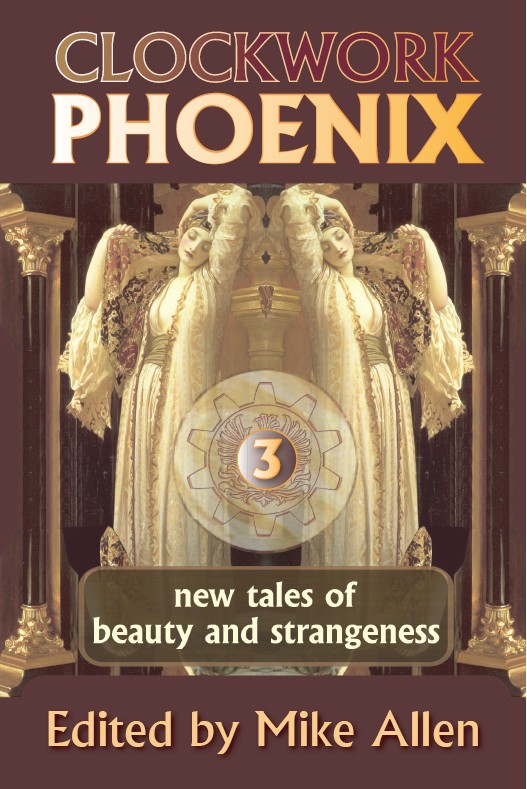

Click here to order it now from Amazon.com!
ISBN #
1607620626
Published July 1, 2010
by
Click here to return to the Main Page
From Publishers Weekly
Allen's third volume of extraordinary short stories reaches new heights of rarity and wonder. Marie Brennan sets the bar high with "The Gospel of Nachash," a fine reinterpretation of the Adam and Eve legend from a fresh perspective. Tori Truslow's scholarly "Tomorrow Is Saint Valentine's Day" tells the story of the Great Ice Train and its encounter with the merfolk on the Moon. Gemma Files's "Hell Friend" and C.S.E. Cooney's "Braiding the Ghosts" are sinister, spine-tingling ghost stories. Cat Rambo deals with realism and escapism in her futuristic "Surrogates," where appearances and reality are mutable. Shweta Narayan's "Eyes of Carven Emerald" eloquently rewrites the history of Alexander the Great to include mechanical entities. Without a wrong note, all the stories in this anthology admirably fulfill Allen's promise of "beauty and strangeness."
— Publishers Weekly, Starred Review
From The Billion Light-Year Bookshelf
As the mystery genre developed, there was a vogue for twist endings in which the murderer proves to be none less than the detective himself -- perhaps through the device of multiple personality disorder or some other psychological crisis which causes the character to perform criminal actions while in an altered state of mind, the memories of which are not available to the character's normal mind. However, moving the murder mystery into the science fiction genre opens additional possibilities, as John C. Wright demonstrates in "Murder in Metachronopolis," in which the detective is none less than the victim.
From Tangent
[...] Murder in Metachronopolis by John C. Wright was one of those rare stories I knew I’d love after the first paragraph. A private eye story, with definite echoes of a noir P.I. film, set in a time travelling future where Masters of Time whisk through time without concern for the possible impact, men like Jacob Frontino act as both investigator and policeman of those Masters who abuse time travel for their own ends. Then Frontino suddenly finds himself recruited to investigate a murder he’s told is his own. Drawn into the mystery with him, our journey is helped by the story's unique structure. Instead of being presented chronologically, the story is broken up into numbered vignettes which the author has arranged in anachronological order. This may sound confusing, and in many cases it would be, but Wright skillfully handles it and the structure aids the mystery.
The story asks a lot of interesting questions about time travel and moral temptation. I thought the protagonist was a dynamic character of many layers and enjoyed the story thoroughly. One of the best in this collection. Recommended highly.
From Impishidea
[...] Murder in Metachronopolis can be described as parable proving time travel impossible and morally wrong. This is the first I’ve seen of a tale discussing the morality of time travel and for this, the story belongs with the aforementioned novel as a must read for time travel fans. The murder mystery proper is actually just a plot device, the central premise and drive being something different. The destination is predictable but Mr Wright seems to be counting on that, using the reader’s expectation to make the story’s journey quite fascinating.
This isn’t to say that the story is flawless. A couple of times John gets a little too enthusiastic in describing the details of the sci fi tech and world he’s painted. Of course the explanations are welcome but with a short story, space is precious. How something works isn’t as important in this format than what something does and any rules involving it. At least he does have a good sense of timing and never lets his explanations disrupt the story’s rhythm. I’d actually encourage John to expand the story into a thin novel (not a brick or airport book size) where he can really drown the reader in details and take us to that world.
In earlier reviews I mentioned that I felt I lacked the cultural comprehension to fully appreciate some stories. Murder in Metachronopolis is a story deeply steeped in classical Western culture. I couldn’t help but chuckle on almost every page at all the nods and references he’s hidden. But if you’re not very aware of Western tradition, you might enjoy this story as well – though it is still quite accessible for nearly everyone.
A big, big plus.
Finally, there’s an interesting note I must reproduce from the semi-appendix.
“Metachronopolis” shares some elements of setting with John’s story in the first Clockwork Phoenix volume, “Choosers of the Slain,” making it the first tale in our pages to expand on a previously introduced multiverse.
So if you enjoy this story well enough (and you should), you’ll now be sorely tempted to pick up the first Clockwork Phoenix. Well played Mike Allen. Well… played.
Contributions include:
• "The Gospel of Nachash" by Marie Brennan
• "Tomorrow is Saint Valentine's Day" by Tori Truslow
• "Crow Voodoo" by Georgina Bruce
• "Your Name is Eve" by Michael M. Jones
• "Hell Friend" by Gemma Files
• "Braiding the Ghosts" by C.S.E. Cooney
• "Surrogates" by Cat Rambo
• "Lucyna's Gaze" by Gregory Frost
• "Eyes of Carven Emerald" by Shweta Narayan
• "Dragons of America" by S. J. Hirons
• "Where Shadows Go at Low Midnight" by John Grant
• "Lineage" by Kenneth Schneyer
• "Murder in Metachronopolis" by John C. Wright
• "To Seek her Fortune" by Nicole Kornher-Stace
• "Fold" by Tanith Lee
• Pinions by the Authors